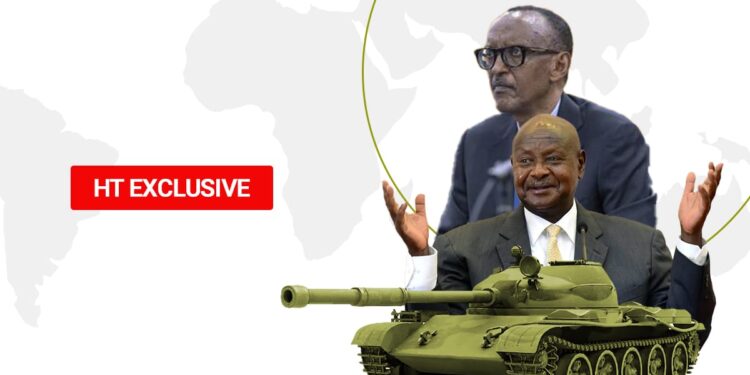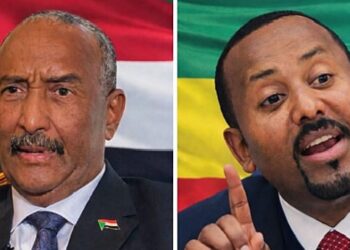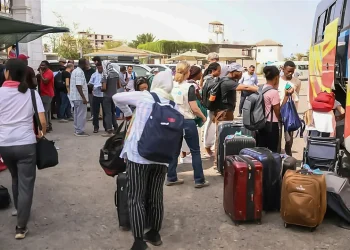By Elie Mutangana, Kigali
Recently, Rwanda and Uganda’s Presidents were spotted in their respective countries paying homage to the tremendous, selfless services rendered by the recently retired Generals from both countries. Their participation in several wars of liberation and military services that the two East African regimes used to take power, and sustain it remains indelible.
The recent extraordinary retirement of the generals and military officers in the two East African countries was recorded as the first simultaneous incident that sent the biggest numbers of retirees out of duties by two countries.
They included two four-star Generals – James Kabarebe of Rwanda Defense Forces (RDF) and General Kale Kayihura of the Uganda’s People Defence Forces (UPDF). These two Generals played remarkable roles through the military evolution of their countries. Despite belonging to two different countries, they once shared military affiliation within different wars that took place in the region decades ago.
For instance, the two Generals fought together in the former National Resistance Army (NRA) rebel that put the current President Yoweri Museveni in the power. The massive retirement also saw 11 other Generals kicked out – 1,013 military officers in Rwanda and 10 other military officers in Uganda, respectively.
The statement of the RDF released on August 30 listed other prominent Generals including Gen Fred Ibingira, Gen Charles Kayonga and Gen Frank Mucyo Kamanzi who exited the army service. There are also other Major Generals such as: Martin Nzaramba, Eric Murokore, August Turagara, Charles Karamba , Albert Murasira and Brigadier Generals, Chris Murari, Didace Ndahiro and Emmanuel Ndahiro. The remaining names of 1,013 junior officers were not listed.
On the other hand, the UPDF list saw Gen Kale Kayihura alongside with Lt Gen James Nakibus Lakara, Maj Gen Sam Wasswa Mutesasira, Maj Gen Joseph Arocha, Maj Gen David Wakaalo, Brig Austine Kasatwooki, Brig Steven Oluka, Brig Frank Katende Kyambadde, Brig Emanuel Kwihangana, Brig Wilson Muhabuzi and Brig Ham Atwooki.
Both Presidents Paul Kagame and Museveni respectively met the retirees and disclosed the acknowledgement of the services they did to their countries. On September 1, Rwanda’s Office of the President announced that President Kagame chaired the retired Generals to express gratitude to the retirees.
Rt. Gen Kabarebe who spoke on behalf of other retirees emphasized that despite their retirement, the force will remain strong. Several officials during the farewell ceremony in Kigali also joined their voices that the retirees will keep on serving as mentors and advisors of those remaining in the service. The retirees also received certificates in recognition of their service rendered.
“The retired Senior Officers thanked the President (Kagame) for his leadership and committed to continuing their contribution to Rwanda’s transformation through their respective expertise and monitoring the younger generation,” the Office posted on X, formerly Twitter.
Similarly, Uganda’s Museveni acknowledged that the retirees played pivotal roles in liberation of Uganda and settlement of peace in Great lakes Region.
Notably, most of these Generals fought with Museveni’s NRA during the “Uganda’s Bush war” of 1980-1986 that overthrew the late President Milton Obote and established Museveni as the President of Uganda from 1986 until today.
“The strong revolutionary force that we built did not only rescue Uganda but somehow contributed to some situations in the region. Therefore, I really congratulate you for belonging to such glorious force and making your own contribution to it because it solved very many problems of our people,” said Museveni to the retirees.
Museveni urged that despite their retirement, the Generals should remain active and ready to keep serving the nation in many others forms of development.
Prior to the retirement news, President Museveni had dropped charges against Rt. Gen. Kayihura who is the former Inspector of Police in Uganda. He had been battling with charges since 2018 when he was detained. He was accused of failure to protect war materials, aiding or abetting criminals, kidnapping and repatriation of Rwanda exiles, refugees and Uganda citizens to Rwanda between 2012 and 2016, according to Uganda’s General Court Martial.
“The state has withdrawn the case, and you’re accordingly set free. I wish you all the best General,” said Brig. Freeman Mugabe, the Chairman of General Court Martial last week. Following the withdrawal of the charges, Gen Kayihura disclosed that he “has got the Justice and freedom”.
“I want to appreciate the President and above all, I want to thank God who has sustained me and who has by his grace made this possible,” Kayihura replied to the decision before he officially got retirement.
Reports say that Museveni’s son, Gen Muhoozi Kainerugaba pleaded with his father to forgive or rehabilitate Gen Kayihura if he did mistakes, citing that the man had been a special cadre in the Uganda’s army and inspired many youth to join Uganda’s forces and serve the nation.
Rwanda’s Kabarebe Retires With Military Records
Beyond having held high military positions in Rwanda Defense Forces, including being the longest serving Minister of Defence in Rwanda for eight years from 2012 to 2010, Rt. Gen. Kabarebe is the only soldier in the world who has served as Military in Chief in two different countries – Rwanda and Congo.
Kabarebe was born in 1959 in Uganda to Rwandan parents. His parents had consequently fled Rwanda following the ethnic conflicts of Hutus and Tustis.
He then grew up in Uganda where he obtained his Bachelor of Arts in Economics and Political science in 1989, as well as military trainings.
Before attending University, Kabarebe had been among the Rwandan refugees to Uganda who joined Museveni’s rebel group – National Resistance Army (NRA) and helped him take power after ousting late President Milton Abote.
With other Rwandan refugees in Uganda, they formed the Rwanda Patriotic Front (RPF) with an armed forces Rwanda Patriotic Army (RPA) that liberated Rwanda and stopped the 1994 Genocide against the Tutsis.
During the liberation war, Kabarebe was serving as the private secretary of Maj. Gen. Paul Kagame, who was the RPF leader. Kagame later appointed him as the Commander of the High Command Unit at their then Headquarters at Mulindi, Northern Rwanda. High Command Unit later became the actual Republican Guard Unit when Kagame took power.
Although Kagame and his RPF had taken power, their opponent was still a threat of concerns. Later, Kagame deployed troops in Democratic Republic of Congo (DRC), formerly Zaire, to neutralize the ex- government forces and genocide perpetrators who were camping there, hence posing threats of raids and concerns of returning back.
The then Congolese President, Mobutu Sese seko was reportedly backing the Kagame opponents, which prompted Rwanda’s decision to invaded Congo in the “first Congo war” of 1996-1998 .
Kagame with the great support from Uganda, sent Rt. Gen. Kabarebe as the Commander of the troops; consisted of both Rwandan and Ugandan forces to Congo to overthrow Mobutu’s government. As a result, Kabarebe successfully ousted Mobutu and installed Laurent-Desire Kabila, who had been opposing Mobutu’s government.
Kabarebe broke the record when he became Army Chief of the Congolese Army for a year under the presidency of the then partner, President Joseph Kabila.
“My task was to organise the Congolese army because those people we helped to get to power had no army for themselves, so we had to stay. It was a continuous exercise of liberating the Congo. But it also gave us the opportunity to fight and neutralize the ex- Rwanda forces within eastern Congo,” Kabarebe said in 2014.
However, Kabila later turned back Kabarebe and his Rwanda and Ugandan soldiers, and ordered them to leave Congo, following the internal ethnic conflicts across the country, which Kabila had perceived to be triggered by the Rwandan influence in DR Congo.
Kabarebe returned back to Kigali but in return, during the second Congo War, Kagame sent him again in Congo to command the offensive operation, coded “Kitona Operations”, hoping to oust President Kabila and reinstall another Government that would favour Rwanda.
But it was unfortunate for Kabarebe at the second time in Congo, as he was defeated by SADC Forces that were deployed in the war to support President Kabila. With his military expertise Rt. Gen. Kabarebe managed to repatriate from the war, his remaining troops to Kigali alive after seizing an airport in Angola that troops used to fly back.
Throughout Kabarebe’s years of military service, he faced different accusations from UN Security Council experts and Human rights watchdogs, of exploitation on minerals in DR Congo during the Congo wars and backing the M23 rebels in eastern Congo.
For instance, in 2012, the UN Security Council accused Kabarebe who was Rwanda’s Minister of Defence at the time, of being the “de facto” Commander of the rebellion in eastern Congo. But over the years, Rwanda has repeatedly dismissed all these allegations citing to be made “scapegoat” of Congolese internal conflicts.




































